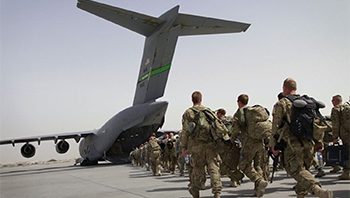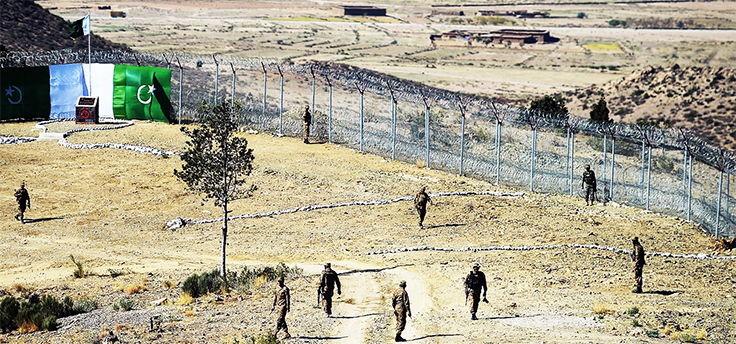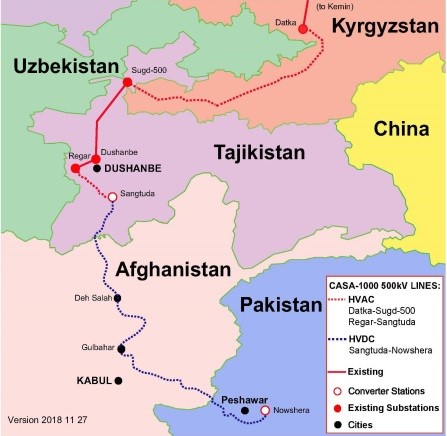| |
|
|
Opinion Piece on
Afghan Peace Talks:
A Step to institutionalize Peace in Afghanistan
By Ahmad AlQadri, Research Associate,
MUSLIM Institute
|
|






|
|
Learning from the history and realising the essence of the Chapter VI, article 33 of the United Nations charter, one can endorse the significance of recent Afghan Peace Talk. According to the article 33, states are suggested to solve their conflicts through negotiations, enquiry, mediation, conciliation, arbitration, judicial settlement, resort to regional agencies or arrangements, or other peaceful means of their own choice. For decade of Afghan war and rounds of peace talks, major actors have once again gathered around the tables. This was the very effort that is made for years by regional and international actors to end war with talks instead bullet. Because, bullet has no ethics, principles, emotions and worth to win heart of the enemy; it just finish the story.
|

Photos – via Corridor.pk, New China, TRT World
|
|
Having employed all of its might, from bullet to the “Mother of all Bombs in Afghanistan, in an attempt to conquer the mighty rocks like Afghans, the US still finds itself unable to “win” the war. American Military expeditions in Vietnam, Iraq etc. in the post-cold war era saw the emergence of China and resurgence of Russia to challenge the existing “new” world order. Military adventures, such as that in Afghanistan, has deviated global politics from liberal hegemony to nationalism and realpolitik – in the words of John Mearsheimer. Current US President Donald Trump himself admitted by saying, “…our foreign policy is a complete and total disaster; we’re rebuilding other countries while weakening our own.” President Trump emphasized in his election campaign to change America’s foreign policy role by unveiling his “America First” policy. The first point of action of this policy was the decision to withdraw US troops from Afghanistan.
Furthermore, in an attempt to make “America Great Again” Trump has initiated and mediated peace dialogues not only among conflicting states but also among non-state actors around the globe. Despite his 2018-2019 National Security Policy– which echoed the policies of those who preceded him i.e. fighting war to achieve peace –in his 2019-2020 National Security Policy Trump has given a chance to dialogue over conflict in the exhaustive war of Afghanistan. A letter addressed to Pakistan by the Trump Administration in order to facilitate dialogue in Afghanistan brought the Afghan Taliban to negotiation table in UAE where terms and objectives of the peace dialogues were set. The first session was attended by US Special Representative to Afghanistan Zalmay Khalilzad.
Adul Salam Rahimi and officials from Pakistan, Saudi Arabia and UAE. Recent successful session of peace dialogue held in Doha, Qatar is also a positive and constructive step towards the achievement of long lasting peace.
|
|
|

US Exit from Afghanistan – via Belt & Road News
Trump’s decision to reduce the number of US troops from 14,000 to just 7,000 caught many by surprise including the incumbent Afghan government. However, time has yet to come when success stories can be recorded in history books about the Afghan peace process. It’s a good initiative from the global leaders to redesign their priorities in order to solve any conflict, as war indeed should be last resort.
Pakistan, along with regional and international actors involved in Afghanistan peace process, has welcomed the peace initiative. Regional stability of South Asia is conditioned with peace and stability in Afghanistan as it is the “heart” of Asia. Successful implementation of many regional projects, such as, the Belt and Road Initiative (BRI), China Pakistan Economic Corridor (CPEC), Turkmenistan-Afghanistan-Pakistan-India gas pipeline, Central Asia South Asia 100 and others, are dependent upon peace in Afghanistan and South Asia at large.
|
|
|

Pak - Afghan Border Fencing – via Pakistan Today
|
|

Photo Via CASA-1000
Peace and stability in Afghanistan will enhance the socio-economic development and transformation of Asia and world at large. The prolonged and neglected Kashmir issue can also be solved following in the footsteps of Afghan peace initiatives, as recommended in many UNSCSRs that are highlighted in ‘Two Day International Kashmir Conference’ organized by MUSLIM Institute in Islamabad. Moreover, the Afghan peace initiative – if successful – would serve as an encouragement and testament to parties involved in conflicts in different regions across the world, whether it be the Korean peninsula, Middle East, Crimea, Latin America, or Africa.
Pakistan being the facilitator in the Afghan peace process should remember the American proverb, “there ain't no such thing as a free lunch.” Pakistan should ask the US to honour Pakistan’s resolve in peace process and show dignity for the sacrifices of Pakistan thus far in the war on terror. US should also be demanded to remove sanctions, reimburse all the expenses, end Indian proxies in Afghanistan, support Afghan border fencing and ensure safe return of Afghan refugees to Afghanistan.
|
|
|
It is almost impossible to achieve the perfect peaceful settlement when it comes to the Afghan war. However, unsatisfactory and hasten withdrawal can result in even more anarchy and prolonged civil war. Case studies of Iraq, Syria and Libya are a testament to this. Peace in Afghanistan is indispensible for political, socio-economic transformation and development of Afghan society and the region at large. It is a positive thing to witness regional countries getting on-board with US and Pakistan’s efforts for the peace process in Afghanistan, which was reflected during Pakistan’s Foreign Minister, Shah Mehmood Qureshi’s visit to Afghanistan, China, Iran and Russia. A well-recognised and mutually agreed Afghan led and Afghan owned socio-political system should be installed in Afghanistan which could end the on-going power struggle amongst social segments of Afghanistan. Parties in the conflict should be given due political recognition which is a pre-requisite for success of any peace effort. The only bone of contention in Afghan peace dialogues is the lack of mutual political recognition of all Afghan stake holders. Therefore, the prerequisite for both Pakistan and USA delegations should be to bring both parties face to face with each other if there is a prospect for lasting peace in Afghanistan. Thus, a rolling stone gathers no moss.
|
|
|
| |
|
|
|
|
|
| |
|